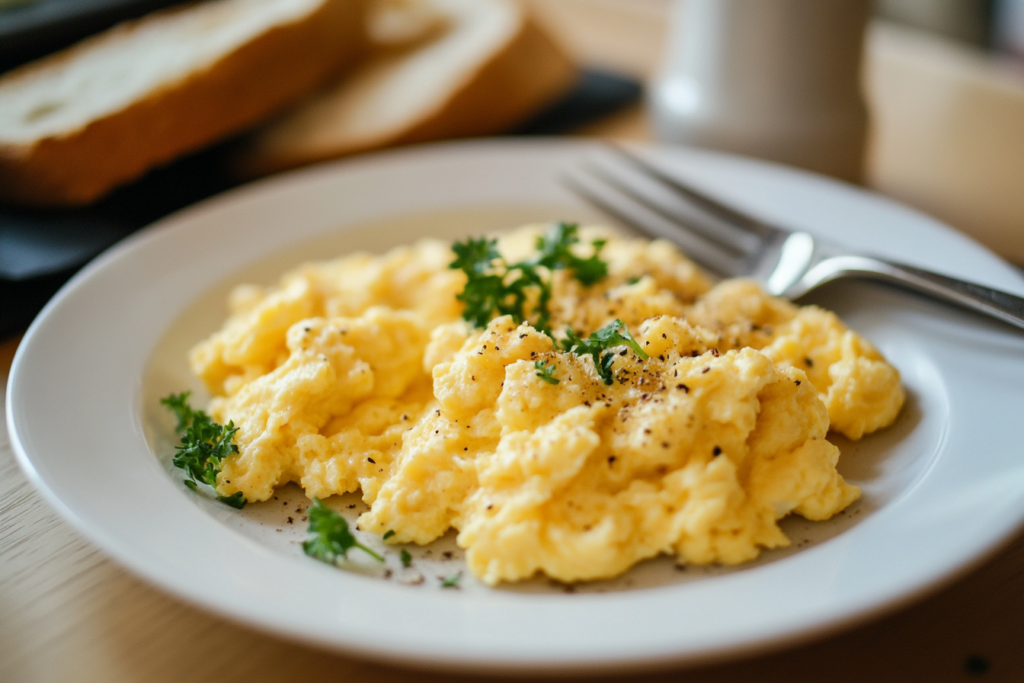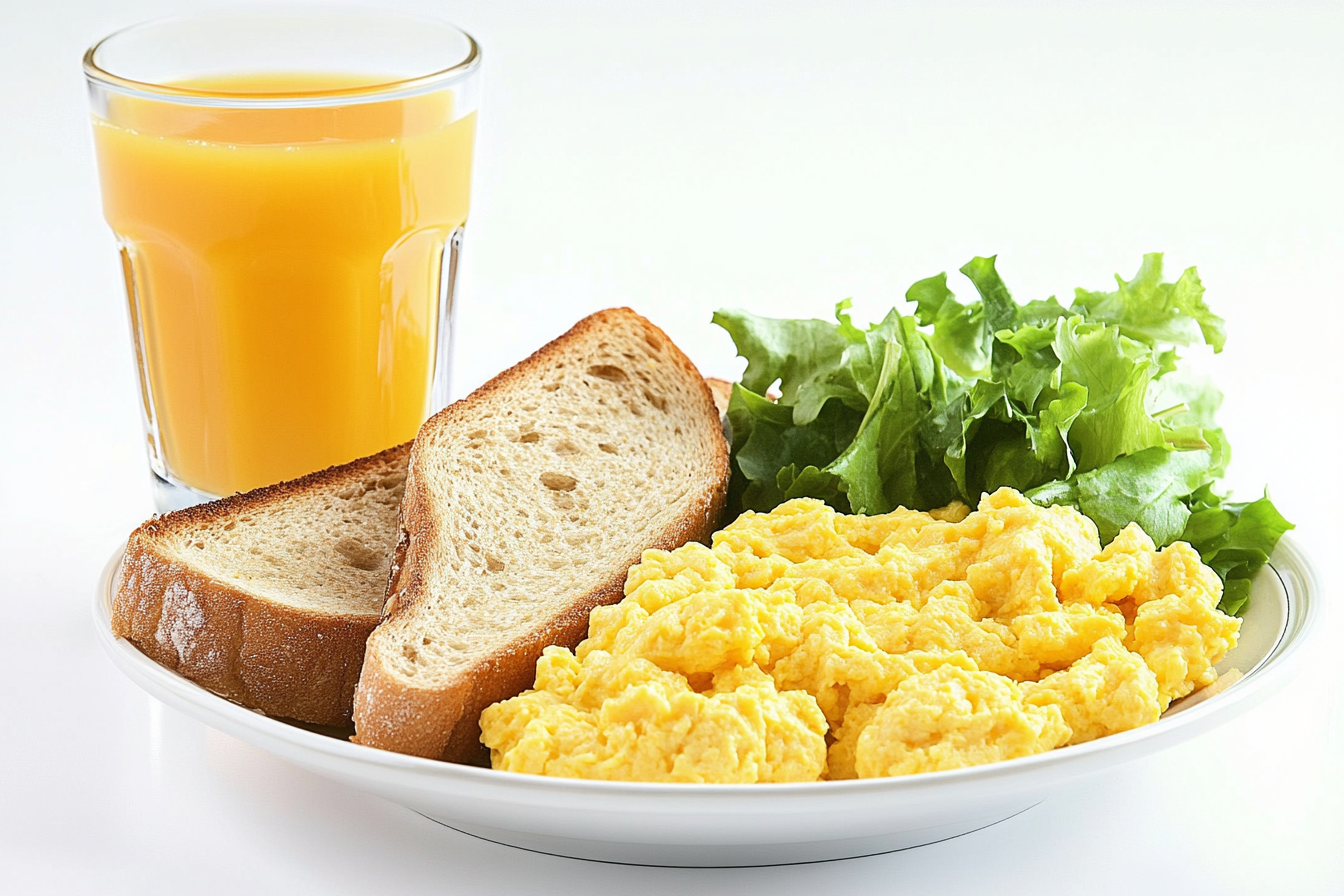Introduction and Overview
How Many Calories Are in 2 Scrambled Eggs?

How many calories are in 2 scrambled eggs? Many people ask this question when they want to manage their calorie intake or maintain a balanced diet. Two scrambled eggs, a breakfast favorite, deliver not only great taste but also essential nutrients. However, calculating the exact calorie count depends on factors like the size of the eggs, the preparation method, and added ingredients such as butter or cheese.
Why Focus on Scrambled Eggs?
Scrambled eggs go beyond being just a tasty breakfast—they provide incredible nutritional value. Their versatility allows you to prepare them in various ways to match individual preferences and dietary goals. Whether you prefer them plain or packed with veggies and herbs, scrambled eggs offer a quick, nutrient-rich meal option.
- Quick and Easy: You can cook scrambled eggs in just minutes, making them perfect for busy mornings.
- Rich in Nutrients: Each serving delivers protein, essential vitamins like B12 and D, and vital minerals.
- Variable Calorie Count: The calorie content varies based on your preparation method and the ingredients you add, ranging from light and low-calorie to indulgent and hearty.
Learning how to adjust the calorie content of scrambled eggs to meet your needs helps you make smarter dietary choices. Since breakfast is the most important meal of the day, why not make it both nutritious and enjoyable?
Understanding the Nutritional Profile of Scrambled Eggs
How Many Calories Are in 2 Scrambled Eggs and Their Nutritional Components?
Eggs, especially when scrambled, are not just a breakfast favorite but a nutritional powerhouse. They provide a mix of macronutrients and essential vitamins while being low in calories.
- Calories in a Single Egg: A single large egg typically contains about 70-80 calories. Most of these calories come from the yolk, which also houses the majority of the nutrients.
- Key Nutrients in Scrambled Eggs:
- Proteins: Each egg provides roughly 6 grams of protein, which aids muscle repair and growth.
- Fats: The yolk contains 5 grams of fat, primarily healthy unsaturated fats.
- Vitamins and Minerals: Eggs are rich in Vitamin B12, Vitamin D, selenium, and choline, essential for brain function and bone health.
Even though scrambled eggs are simple to prepare, their nutritional content can shift depending on how they’re cooked and the ingredients used.
How Cooking Methods Influence the Calorie Count of Scrambled Eggs
Cooking eggs not only alters their texture and flavor but also impacts their calorie content significantly.
- Scrambled Eggs vs. Other Cooking Methods: When compared to boiled eggs, scrambled eggs often require fats like butter or oil, which adds calories.
- How many calories are in 2 scrambled eggs? Two plain scrambled eggs typically contain 140-160 calories, whereas two boiled eggs average around 140 calories.
- Comparison with Fried Eggs: Fried eggs, often cooked with more oil or butter, can add 40-50 calories per tablespoon, making them a higher-calorie option than scrambled eggs.
Scrambled eggs are a healthier choice when cooked with minimal fat, making them an excellent option for calorie-conscious individuals.
How Additives Can Affect the Calories in Scrambled Eggs
The adaptability of scrambled eggs allows for endless variations, but added ingredients can dramatically increase the calorie count.
- Butter and Oil: Using a tablespoon of butter adds 100 calories, while olive oil contributes 120 calories.
- Milk and Cream: A tablespoon of milk adds 10 calories, but cream can increase the total by 20-30 calories.
- Cheese: Adding a slice or a tablespoon of cheese contributes anywhere from 50-100 calories, depending on the type.
By controlling the type and amount of additives, you can enjoy a flavorful breakfast while keeping your scrambled eggs aligned with your dietary goals.
Detailed Calorie Breakdown
Calorie Count for 2 Plain Scrambled Eggs
So, how many calories are in 2 scrambled eggs? If you keep it simple, two large scrambled eggs prepared without any additives typically contain 140-160 calories. This estimate assumes no butter, oil, or milk—just eggs cooked in a non-stick pan.
To validate these numbers, trusted nutritional resources like Healthline confirm that scrambled eggs are naturally low in calories while remaining nutrient-dense.
Comparison Between Egg Sizes
The calorie count for scrambled eggs can vary depending on the size of the eggs you use:
- Small Eggs: About 50-60 calories per egg.
- Medium Eggs: Approximately 60-70 calories per egg.
- Large Eggs: Around 70-80 calories per egg.
If you’re preparing a dish with two large eggs, your base calorie count starts at 140 calories. Add-ins like butter or cheese can significantly alter the final count.
How Cooking Spray or Butter Changes the Count
The type of fat used to cook scrambled eggs plays a big role in their calorie content:
- Non-stick Spray: Adds virtually 0 calories.
- Butter: Adds 100 calories per tablespoon.
- Olive Oil: Contributes 120 calories per tablespoon.
Even small amounts of butter or oil can shift your scrambled eggs from a light meal to a higher-calorie dish.
Calories from Popular Add-Ons

While scrambled eggs can be enjoyed plain, many people add ingredients for flavor. Here’s how these extras impact the calorie count:
- Vegetables:
- Onions or bell peppers: 5-10 calories per tablespoon.
- Spinach: Virtually 0 calories per tablespoon.
- Proteins:
- Ham: Adds around 30-50 calories per tablespoon.
- Plant-based sausage alternatives: Typically 50-80 calories.
- Cheese:
- Cheddar: Contributes 60-70 calories per tablespoon.
- Feta: Adds about 50 calories per tablespoon.
Customizing your scrambled eggs with these ingredients allows you to fit them into various dietary goals without sacrificing taste.
Scrambled Eggs in Different Diet Plans
Are Scrambled Eggs Suitable for Weight Loss?
If you’re wondering how many calories are in 2 scrambled eggs for weight loss, you’ll be pleased with the answer. These eggs offer a low-calorie, nutrient-rich, and protein-packed option. Their high protein content helps reduce overall calorie intake by keeping you full and satisfied.
- Low-Calorie, High-Protein Benefits: With roughly 140-160 calories for two plain scrambled eggs, they easily fit into calorie-restricted diets. Additionally, the protein content (about 12 grams) helps control hunger and supports muscle maintenance.
- Portion Control Considerations: Although scrambled eggs are naturally light, be mindful of calorie-heavy add-ons like butter, cheese, or cream. Opt for low-calorie ingredients like vegetables to keep the calorie count in check.
By keeping your preparation simple, scrambled eggs become a highly adaptable and satisfying option for those focusing on weight loss.
Scrambled Eggs and High-Protein Diets
Are scrambled eggs compatible with protein-heavy diets like keto or paleo? Absolutely! Their macronutrient profile aligns perfectly with these diet plans.
- Compatibility with Keto and Paleo Diets: The natural fats in the yolk and the absence of carbs make scrambled eggs ideal for keto. Paleo dieters can enhance their eggs with nutrient-dense, low-carb veggies like zucchini or asparagus.
- Balancing Macros: Adding cheese or cream to your scrambled eggs can increase the fat content for keto, while Paleo followers might prefer olive oil or avocado as a healthy fat source.
Whether you’re following keto, paleo, or any high-protein plan, scrambled eggs remain a breakfast go-to.
Vegan and Vegetarian Alternatives
For vegans and vegetarians, the answer to how many calories are in 2 scrambled eggs shifts slightly when using plant-based options.
- Plant-Based Egg Substitutes: Products like JUST Egg or tofu scramble offer a similar texture and taste. JUST Egg, for instance, contains about 70 calories per serving, mimicking the calorie count of a single egg.
- Calorie Content: Vegan egg substitutes generally range from 60-100 calories per serving, making them a viable option for calorie-conscious eaters.
Vegetarians can continue enjoying traditional eggs, while vegans can explore substitutes to enjoy their version of scrambled eggs.
Health Benefits and Risks of Scrambled Eggs
Why Scrambled Eggs Are Nutritious
Eggs, especially when scrambled, provide a host of health benefits beyond their great taste.
- Protein Content and Muscle Repair: Scrambled eggs deliver approximately 12 grams of protein in two large eggs, essential for repairing muscle tissue and maintaining strength.
- Richness in Vitamins: They’re a natural source of Vitamin B12, which supports nerve function, and Vitamin D, which promotes bone health and immune function. The yolk alone contains these vital nutrients, making scrambled eggs a nutritional powerhouse.
When incorporated thoughtfully into your diet, scrambled eggs offer not just sustenance but a boost in overall well-being.
Cholesterol Concerns
For years, eggs were shrouded in controversy regarding cholesterol, but recent studies have clarified the facts.
- Addressing Egg Cholesterol Myths: While one large egg contains around 186 mg of cholesterol, research indicates that dietary cholesterol has a minimal impact on blood cholesterol levels for most people.
- Safe Consumption Limits: According to experts like those at Mayo Clinic, consuming up to 7 eggs per week is safe for individuals without pre-existing cholesterol issues.
Understanding these nuances can help you embrace eggs without guilt, as part of a balanced diet.
Overconsumption Risks
As with any food, moderation is key. Overeating scrambled eggs can lead to an imbalanced diet or excessive calorie intake.
- Balancing Eggs with Other Diet Components: While eggs are rich in protein and fats, relying solely on them could limit your intake of other important food groups, such as fruits and vegetables.
Maintaining variety in your meals ensures you’re getting the full spectrum of nutrients your body needs.
FAQs About How Many Calories Are in Scrambled Eggs
How Many Calories Are in 2 Scrambled Eggs With Milk and Butter?
Adding milk and butter to scrambled eggs enhances their creamy texture but increases their calorie count. A tablespoon of whole milk adds approximately 10 calories, while a tablespoon of butter contributes around 100 calories. If you prepare 2 scrambled eggs with milk and butter, the total calorie count can climb to 220-260 calories.
Are Scrambled Eggs Lower in Calories and Healthier Than Fried Eggs?
Scrambled eggs typically provide more health benefits than fried eggs. Preparing fried eggs often involves using more oil or butter, which increases the dish’s calorie count by 50-100 calories. On the other hand, you can prepare scrambled eggs with minimal fat to create a lighter, healthier option. This method retains their rich nutritional profile without adding unnecessary calories.
Can I Eat Scrambled Eggs Every Day and Still Maintain a Balanced Diet?
Yes, you can enjoy scrambled eggs daily as part of a balanced diet. They’re an excellent source of protein, vitamins, and healthy fats. However, moderation is key, especially for individuals managing cholesterol levels. Including a variety of proteins and vegetables alongside eggs ensures you meet all your nutritional needs.
Do Organic Eggs Have Fewer Calories Than Regular Scrambled Eggs?
Organic eggs and conventional eggs have similar calorie counts—approximately 70-80 calories per egg. The primary difference lies in the nutritional content, as organic eggs may contain higher levels of omega-3 fatty acids and other nutrients, depending on the chickens’ diet.
What Is the Calorie Count of Scrambled Egg Whites Without the Yolks?
Egg whites are the go-to option for those looking to reduce calories and cholesterol. Each egg white contains roughly 15-20 calories. Scrambling the whites of two eggs results in a dish with only 30-40 calories, making it an excellent low-calorie alternative to whole scrambled eggs.
How Can I Make Scrambled Eggs Healthier and Lower in Calories?
Absolutely! Opt for cooking spray instead of butter, and use low-fat milk or water to reduce calories. Incorporate nutrient-dense add-ons like spinach, tomatoes, or onions to boost flavor and health benefits without significantly increasing the calorie count.
Wrapping Up: The Calorie Count of Scrambled Eggs

Recap of Calorie Range
Scrambled eggs are a versatile and nutritious breakfast choice, with their calorie count largely depending on preparation methods and additional ingredients. Two plain scrambled eggs typically contain 140-160 calories, but with butter, milk, or cheese, the number can rise to 220-260 calories. For a lighter option, consider using egg whites or plant-based substitutes.
Encouragement to Make Informed Dietary Choices
Understanding the calorie and nutrient content of scrambled eggs allows you to enjoy them guilt-free. Whether you’re preparing them as part of a weight-loss plan or simply savoring a hearty breakfast, they’re a delicious and adaptable option. By balancing your meals and incorporating fresh, healthy ingredients, you can turn scrambled eggs into a dietary staple that supports your health goals.
Now, go ahead—whip up a batch of scrambled eggs that suits your taste buds and your lifestyle!

